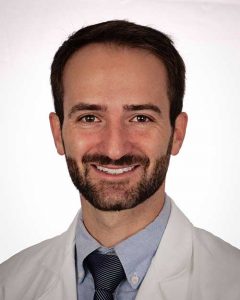 Evan Morris Zeitler, MD, is an assistant professor in the Division of Nephrology and Hypertension. He has been interested in teaching and human physiology since he was 13 years old, when he volunteered at the Natural History Museum in Denver, Colorado. Dr. Zeitler enjoys getting to know patients to learn about their health problems from their perspective and then work together to form a plan of care that centers the patient.
Evan Morris Zeitler, MD, is an assistant professor in the Division of Nephrology and Hypertension. He has been interested in teaching and human physiology since he was 13 years old, when he volunteered at the Natural History Museum in Denver, Colorado. Dr. Zeitler enjoys getting to know patients to learn about their health problems from their perspective and then work together to form a plan of care that centers the patient.
What brought you to UNC Medical Center?
My wife (another physician at UNC) and I moved here for medical school in 2009 and never left! We love the quality of life in Chapel Hill, and are moved by the mission of the UNC Medical Center to serve the people of North Carolina. The opportunity to work with dedicated, brilliant people every day is icing on the cake.
Where are you from?
I grew up in Denver, Colorado, and I’m lucky to visit my parents there when I can.
Did you always want to be a doctor?
After I realized I couldn’t be a firetruck, doctor seemed like the next best choice. I have had the privilege of being inspired by other doctors in my family, whose clear joy and passion for their jobs made it clear to me from an early age what I wanted to do.
How did you choose your specialty?
Nephrology is the ultimate choice for someone who has loved physiology since the first time I heard the word. It requires both broad knowledge and specific experience, which is both challenging and incredibly rewarding.
What do you find most rewarding about your work?
Seeing physiology in action every single day. Whether I am in the lab looking at a zebrafish kidney under the microscope or making a treatment plan with a patient in clinic, I get to work on complex physiology problems.
What are some of the new developments in your field of specialty?
Nephrology has experienced a revolution in the last decade. From being a specialty where “nothing can be done” for most patients, we have become a specialty where each year seems to bring a new therapeutic option that not only helps slow declines in kidney function, but provides meaningful outcomes for patients, such as reducing the risk of heart attack and death. It’s an incredible time to be in nephrology and nephrology research.
Is there a particular achievement (professional or personal) that has been most gratifying to you?
Achievement-wise, I may have peaked in 8th grade when I won the spelling bee at my school. But since then, raising my children with my wife has been the most gratifying thing I could ever imagine.
What is the best advice you’ve ever received?
Professionally, the best advice I’ve ever gotten was that practicing medicine is not a multiple-choice exam. Medical training is focused on gaining and assessing knowledge, but once you are a physician taking care of patients, the subtleties of medicine reveal themselves.
If you weren’t a physician, what would you like to be doing?
I think I would be a biologist, maybe in particular an entomologist. I’m fascinated by bugs and their incredible variety of adaptations to different lifestyles.
What hobbies do you enjoy?
I love to play tennis, ski (when I can get back to Colorado) and play with my kids. We really enjoy getting out to go hiking in the Triangle together, and I’m trying to learn to identify birds while we do so.
Do you have a favorite quote or life motto?
In both life and practice, I always return to this deeply meaningful Paul Kalanithi quote from When Breath Becomes Air: “The secret is to know that the deck is stacked, that you will lose, that your hands or judgment will slip, and yet still struggle to win for your patients. You can’t ever reach perfection, but you can believe in an asymptote towards which you are ceaselessly striving.”
What was the last book you read?
How the Word Is Passed by Clint Smith. Extremely impactful.